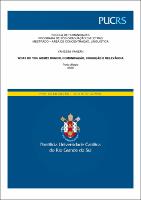| Share record |


|
Please use this identifier to cite or link to this item:
https://tede2.pucrs.br/tede2/handle/tede/9177| Document type: | Dissertação |
| Title: | What do you meme? : humor, comunicação, cognição e relevância |
| Author: | Oliveira, Vanessa Cristiane Vanzan de  |
| Advisor: | Ibaños, Ana Maria Tramunt |
| Abstract (native): | Esta pesquisa, sob o viés cognitivo-inferencial da Teoria da Relevância de Sperber & Wilson (1996), apresenta seis análises e a possível compreensão inferencial, através dos comentários postados por usuários em duas redes sociais, de memes da internet de conteúdo humorístico. As interações são analisadas e categorizadas em: i) bem-sucedida e ii) malsucedida. Como hipóteses para (i) estabelecemos: a possível contribuição do humor para a alta relevância, e para (ii): a baixa ou nenhuma relevância para o processamento, considerando o conhecimento prévio como possivelmente determinante para tal. Os memes da internet são um produto da atual cultura digital e, sendo assim, tipificam muitas das qualidades dessa forma de comunicação. Sabemos que, por tratarmos de um gênero humorístico, o processamento pode ser ainda mais dependente da capacidade inferencial do destinatário, pois é ele que deve realizar as inferências e selecionar os contextos a serem acessados (GOLDNADEL & OLIVEIRA, 2007; YUS, 2016). Por este motivo, apresentamos análises que evidenciam o processamento com definições específicas não só de aspectos da Teoria da Relevância, mas também definições teóricas que passam pela elucidação da transmissão de cultura. Assim como questões voltadas para questões cognitivas de interpretação do humor (SANTOS, 2014; YUS, 2018). Em relação ao humor, apresentamos uma possível organização do caminho interpretativo para que o usuário chegue até o significado do enunciado -neste caso o do meme da internet- considerando também o papel das imagens, que afetam diretamente a dedução e derivação de conclusões (FORCEVILLE, 2014). Evidenciamos que a relevância de processamento em textos de humor, mesmo com baixo valor informativo, está relacionada a efeitos (YUS, 2018c) que vão além da esfera comunicativa, mas que mesmo assim são altamente relevantes. Durante o desenvolvimento da pesquisa percebeu-se que: a hipótese (i) foi parcialmente corroborada, dado que, mesmo em memes de conteúdo humorístico, alguns usuários parecem não criar as inferências esperadas; e que a hipótese (ii) parece ser corroborada, principalmente em memes mais dependentes de contexto percebeu-se um maior número de comentários de usuários que parecem não fazer as inferências esperadas. Sendo os comentários postados em ambiente virtual uma ótima forma de investigação acerca de questões pragmático-cognitivas, que passam pelo humor e, consequentemente, por questões culturais, acreditamos que o presente estudo apresenta contribuição significativa para a área ao fornecer análises de situações de interação linguística retiradas de corpora atual e dinâmico como as duas redes sociais. |
| Abstract (english): | This research presents six analysis considering the possible understanding of internet memes on two social medias, through the comments posted by users under the cognitive-pragmatic bias of Sperber & Wilson's Relevance Theory (1996). The linguistic interactions are analyzed, through user comments, and categorized into: i) successful and ii) unsuccessful. We stablish as hypothesis for (i) the possible contribution of humor to the creation of the optimal relevance, and for (ii) the lack of relevance to the processing, onsidering previous knowledge as a possible determinant for that. Memes are a product of digital culture, and therefore many characteristics of this way of communicating can be observed in this modality. Processing may be even more dependent on the addressee’s inferential capacity when one is dealing with humorous genre (GOLDNADEL & OLIVEIRA, 2007; YUS, 2016). The addressee needs to infer and select the best contexts to be accessed. For this reason, we present our analyses highlighting the cognitive processing with some specific definitions that show not only aspects of the Relevance Theory, but also more modern theories, which include the elucidation and transmission of culture, focused on cognitive issues on humor interpretation (SANTOS, 2014; YUS, 2018). We present a way of organizing the interpretative path so that the language users can get the utterances’ meaning, specially, internet meme’s meanings, considering the role of images, which directly affect the deduction and derivation of the assumptions (FORCEVILLE, 2014). We highlight that the relevance of humorous texts, which present little informative value, is generated due to effects (YUS, 2018c) that are beyond the act of communication itself. The results of the analysis indicate that: (i) was partially confirmed, not all humorous memes were optimally processed; and (ii) was confirmed, considering the comments, especially on more context-dependent memes, the internet users did not create the intended inferences. Considering the comments posted on the virtual environment a rich way of researching about pragmatic-cognitive topics on linguistic studies, which is related to humor as well as cultural aspects, we believe that this study contributes to the field by offering significant insights on linguistic interaction found on dynamic corpora. |
| Keywords: | Teoria da relevância Interações linguísticas Cognição Humor Relevance theory Linguistic interaction Cognition Humor |
| CNPQ Knowledge Areas: | LINGUISTICA, LETRAS E ARTES::LETRAS |
| Language: | por |
| Country: | Brasil |
| Publisher: | Pontifícia Universidade Católica do Rio Grande do Sul |
| Institution Acronym: | PUCRS |
| Department: | Escola de Humanidades |
| Program: | Programa de Pós-Graduação em Letras |
| Access type: | Acesso Aberto |
| Fulltext access restriction: | Trabalho não apresenta restrição para publicação |
| URI: | http://tede2.pucrs.br/tede2/handle/tede/9177 |
| Issue Date: | 13-Mar-2020 |
| Appears in Collections: | Programa de Pós-Graduação em Letras |
Files in This Item:
| File | Description | Size | Format | |
|---|---|---|---|---|
| Dissertação VANESSA VANZAN 06 05 2020 ATA 9.pdf | VANESSA_VANZAN_DIS | 1.39 MB | Adobe PDF |  Download/Open Preview |
Items in DSpace are protected by copyright, with all rights reserved, unless otherwise indicated.




